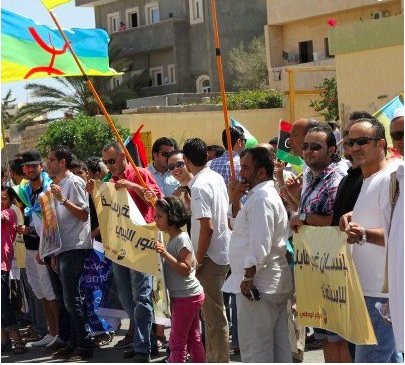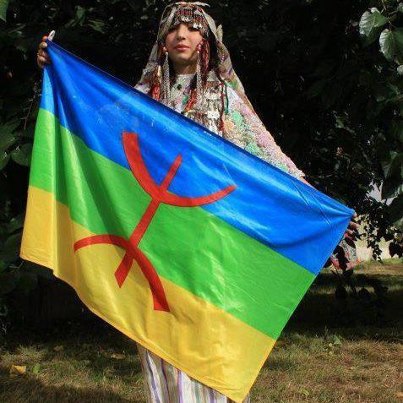By Terry Friel
Tripoli:
For decades, they were not just suppressed in Libya, their very existence was denied.
They were tortured, jailed or killed for speaking their language or flying their distinctive flag.
Although the Amazigh people, the traditional Berbers of northern Africa, long predate the seventh century Arab-Islamic arrival in the country, Muammar Qaddafi quashed their culture to create a new narrative of a purely Arab and united nation.
“We were marginalised,” said Mazigh Buzakhar, a founder and leader of the Tira Association, also known as the Amazigh Cultural Movement.
“We were forbidden to speak or write our language.”
Today, after the revolution, their striking blue, green and yellow flag overlaid with a stylised figure is sold alongside the new Libyan flag at stalls in Martyrs’ Square in central Tripoli.
The language, Tamazight, with its Greek-like symbols, can be found in the magazines of the flourishing new media and heard on new radio stations.
Libya’s Amazigh make up about 10 percent of Libya’s roughly 6.5 million people.
There are more than 20 million Tamazight speakers across northern Africa, according to the School of Oriental and African Studies in London.
Spread out through countries such as Morocco, Tunisia, Algeria, Niger, Mauritania and Mali, they are one of the world’s largest groups without their own nation.
Libya’s Amazigh issue is symptomatic of the problems facing governments across the Middle East in dealing with minorities – from the Baloch and Azeris in Iran to the Copts in Egypt.
In the Arab Spring countries, the removal of autocratic regimes has taken the lid off ethnic, religious and cultural rifts.
Qaddafi pressed researchers, some from overseas, to rewrite history to say the Amazigh were Arabs, said Sara Aboud, who studied a master of arts in history at Tripoli University, where she quietly focused on Amazigh history with the help of an Amazigh lecturer.
In the 1980s, scores of Amazigh activists were jailed. Many simply disappeared. Under Qaddafi, just speaking Tamazight could result in torture or death, according to activists.
“Amazir culture was taboo,” said Mr Buzakhar. “Qaddafi just wanted one colour and one shape.”
Amazigh names were not accepted in official birth registries.
“At the time, the simplest way to preserve our culture was to keep it at home,” said Ms Aboud.
After years of repression, Amazigh battalions — especially from the Jebel Nafusa — were quick to join the revolution. Some of their brigades helped liberate Tripoli.
But as Libya goes through the painful process of writing a new constitution for a new country, Buzakhar and Ms Aboud fear Amazigh rights and their language will be ignored.
Already, there have been demonstrations demanding the new constitution recognise the Amazigh culture and Tamzight as Libya’s second language.
“There still an Arabised mentality,” said Ms Aboud.

(photo by Ahmed Smama via Jadu Free Channel)
“The concept of diversity is an alien to Libya and Libyans” analyst Mohamed Eljarh writes in the online portal Middle East Online.
“Some of my Arab friends view the acknowledgement of the Amazigh culture and identity in the constitution as a threat to the Arab authority and control in the region, and subsequently as a threat to the existence of Arab identity and culture.
“Many of the Amazigh I speak to fear that the rest in Libya does not value their contribution to revolution in Libya,” he wrote.
“The previous National Transitional Council made numerous promises vague promises that the rights of the Amazigh would ensure and protected without guarantees or elaboration on the matter of any kind.”
Already, there have been several demonstrations by Amazigh for more rights.
Many draw hope from Morocco, where the new constitution there recognised Tamazight and where an Amazigh TV station broadcasts to neighbouring countries.
But in a Libya still wrapped in conflict, there are many other priorities.
The fledgling government cannot control the militias — even those who work for it under the interior ministry.
It is battling increasing tribal and regional divisions and struggling to rebuild an economy and form a functioning government.
Regardless, there are strong signs of an Amazigh cultural revival.
Before the revolution there were isolated pockets in the vast country where Amazigh culture could be practised more openly.
“But we struggled,” Ms Aboud said.
However, this year, at least one school in the south will start teaching Tamazight.
With flags in stalls and Tamazight on the news-stands, there is a sense of a gradual, tentative change in attitude in fellow Libyans.
“A lot of other Libyans are starting to realise, and ask what Amazir is,” said Mr Buzakhar.
Said Ms Aboud: “It’s been a short time, but we have done so many things.”
“Now I can proudly say I am Amazir. I can proudly raise my flag.”
This article originally appeared in The National in Abu Dhabi. It is reproduced with permission from the paper and from the author who has been working in Libya this year. [/restrict]











